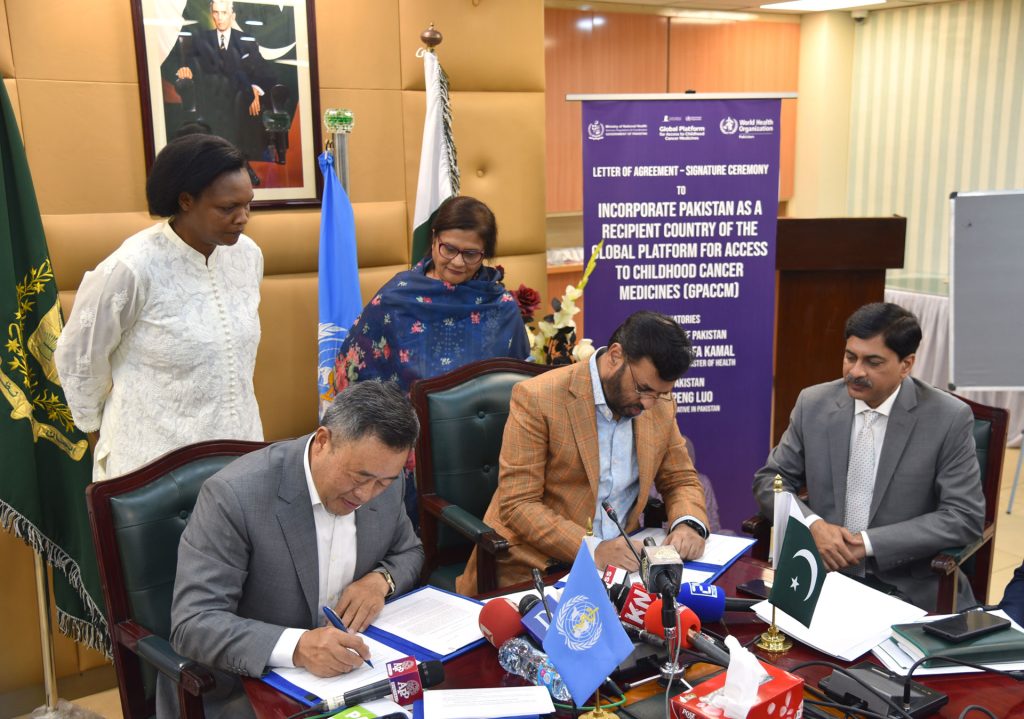In a groundbreaking public health initiative, Pakistan has taken a historic step by signing a national agreement that guarantees free access to life-saving cancer medicines for thousands of children every year. This bold partnership, formed with the World Health Organization (WHO), aims to deliver free, quality-assured childhood cancer drugs to approximately 8,000 children annually.
This move marks Pakistan’s formal inclusion in a global platform specifically designed to increase equitable access to cancer care for children in low- and middle-income countries. For countless families, the financial and logistical burden of cancer treatment has long been a barrier to hope. This program addresses that directly ensuring that no child dies simply because their family couldn’t afford the necessary treatment.
Bridging the Survival Gap in Childhood Cancer
Childhood cancer is curable in most cases especially when detected early and treated properly. However, survival rates vary dramatically depending on geography and healthcare access. In high-income countries, the survival rate for children with cancer hovers around 80%. In contrast, Pakistan’s current survival rate is estimated at just 30%.
This initiative sets a national goal: to double the childhood cancer survival rate in Pakistan to 60% by 2030. This ambitious objective reflects a deep commitment to saving lives and investing in the nation’s future its children.
How the Program Works
This program is a carefully coordinated effort among national and international health stakeholders. Under the agreement:
- Essential cancer medicines will be provided completely free of charge to eligible children throughout Pakistan.
- UNICEF will handle procurement and distribution of the medicines, ensuring timely delivery to hospitals and cancer treatment centers across all provinces.
- WHO will provide the technical expertise required to design, implement, and monitor the program.
- The Ministry of Health will oversee integration of the program into the national healthcare infrastructure, ensuring alignment with local needs.
This unified approach strengthens both immediate access and long-term capacity in the health system.
Ensuring Quality and Continuity
Every medicine provided under this program will be quality-assured, following international safety and efficacy standards. This ensures that children receive the same level of care that would be expected in well-resourced healthcare systems.
In addition, the agreement includes strong provisions for continuous supply and operational stability. The program will remain in place until December 31, 2027, with options to renew and expand as necessary. This guarantees more than short-term relief it lays the foundation for sustainable, long-term impact.
Beyond Medicines: Strengthening the System
This program is not limited to the delivery of medication. It represents a much broader transformation of pediatric oncology care in Pakistan. Key areas of development include:
- Training for healthcare workers in the diagnosis, treatment, and follow-up of childhood cancer cases.
- Improved diagnostic facilities for early and accurate detection.
- Standardized treatment protocols to ensure consistent, high-quality care nationwide.
- Community awareness campaigns to reduce stigma, encourage early treatment, and empower families with knowledge.
- Data collection and monitoring to ensure transparency, track outcomes, and guide continuous improvement.
This multifaceted strategy will strengthen the national health system and pave the way for improved care in other disease areas as well.
Putting Children First
Every child deserves a chance at life, regardless of where they are born or their family’s financial background. Cancer should not be a death sentence simply due to lack of access. By making cancer treatment a national priority, Pakistan is putting its children at the center of healthcare policy.
This initiative brings hope to thousands of families across the country families who have too often faced uncertainty, heartache, and unbearable financial strain. With this program in place, many of those children will now be able to recover, grow, and thrive.
A Vision for 2030 and Beyond
This partnership is a symbol of what’s possible when national commitment meets global support. The year 2030 stands as a powerful milestone: a target by which Pakistan aims to double survival rates, reduce childhood mortality, and redefine its public health legacy.
But more than a target, this vision is about creating a future where every child fighting cancer has access to the treatment they need without delay, without disparity, and without despair.
By investing in the health of its youngest citizens, Pakistan is not only addressing a critical challenge it is building a healthier, more just, and more compassionate nation for generations to come.



Comments (0)
No comments yet. Be the first to comment!
Leave a Comment